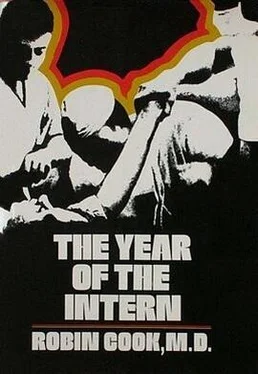Surprisingly, he was conscious, although dazed.
“Do you have any pain?”
“No, no pain. But I have something in my right eye.”
God, with all that injury he was worried about a cinder in his eye. I took it out. His blood pressure was all right, the pulse a little high at 120. I started an IV and sent up a sample for type and cross match, arbitrarily picking five units of blood to be available. He apparently didn’t need blood right away, but he obviously was facing some bone surgery. With a hemostat I tried to stop a little of the blood oozing out of the leg muscles, which were in plain view. It amazed me how little he bled.
I went back to the lady who had vomited up the blood and was relieved to find her blood pressure holding up well. Perhaps she had just swallowed the blood, I reasoned; after all, she was bleeding from both nostrils. Twenty minutes had passed since the ambulances pulled in, and some others from the house staff were there now, helping to stabilize the patients. I got X-ray to come down and shoot a group of heads and chests and other bones. No description could capture the uproar of that time. It was total chaos, as colds and diarrhea and babies and asthmatics mingled with broken bones and crushed heads. Nor did matters improve much when the attendings arrived and began ordering everyone about. The OR, alerted earlier, finally began to absorb the automobile-accident patients.
Dr. Sung called again, threatening to file a complaint with the hospital if I didn’t get right on that horse serum. At that point I didn’t give a damn about his horse serum, so I hung up on him. This brought him storming in about twenty minutes later, ready to give me hell, just as we were moving the last of the critically injured up to surgery. I stood there, covered with a mixture of blood and vomitus, vaguely hearing him rant. This lunatic could get me into real trouble, so I didn’t say anything except to mention the Hypertet again, and how much quicker it would have been. That made him even madder, and he stomped out taking his patient with him. Sure enough, a written reprimand showed up in my box a few days later. So much for priorities.
By eleven the cyclone had passed, leaving the usual jumble of patients with lesser complaints, a much larger number than usual because of what had gone before. They were everywhere — inside, outside, sitting on the ambulance platform, on the floor, in chairs. I began to go from one room to another, half listening, performing like a tired machine. One man had fallen by his pool during a party, breaking his nose on the diving board as he went down and cutting his thumb on a gin-and-tonic glass. The nose was straight, so I left it alone. The laceration I sutured rapidly, after telling his private M. D. the sad story. Even he sounded drunk.
It was, in fact, a big night for drunks; most of them were suffering from minor cuts and bruises or premature hangovers, with nausea and vomiting. And the kids were still coming in, long after bedtime, with their diarrhea and runny noses and fevers. Occasionally I had one with a temperature of around 104, yet I wouldn’t be able to find anything wrong. This made me very uncomfortable. As a human being you have an almost irresistible desire to treat; you are expected to treat. The parents almost invariably clamored for penicillin, but I had enough sense not to give in most of the time. To treat a symptom like fever without a firm diagnosis is bad medicine; and yet I often got only a fleeting and rather limited look at the eardrums or the throats of those miniature screamers. Sometimes I treated, sometimes not; always I went on half-educated guesses.
It went on being a typical Saturday night in the ER. The crowd thinned out about 1:00 A.M. From now on we would see less of the various things that drove people away from their TV sets during the evening to seek the sanctity of the ER — things like colds, diarrhea, and minor puncture wounds. In about an hour, the problems that were keeping them from falling asleep would begin to appear. The same ailments they had ignored all day and through the early evening would, of course, keep them awake, forcing them to the ER in the middle of the night to see the astute and understanding intern. Like itchy thighs. On another tour of duty, I had fallen asleep around 5:00 A.M. only to be awakened because some patient had itchy thighs.
Slightly after one an ambulance pulled up without its siren, and the crew unloaded a peaceful-looking girl in her early twenties who was in a deep sleep approaching coma. Ingestion. The usual, as I found out: twelve aspirins, two Seconals, three Libriums, and a handful of vitamin tablets. All of these drugs, except maybe the vitamins, could be dangerous — especially Seconal, a sleeping pill — but you had to take quite a few of them if you were really serious. Otherwise it was only a gesture, a childish cry for attention within the social fabric of the individual’s life; the usual ingestion case is a young woman lost in the unreal world of True Romance magazine. I could be interested and sympathetic, but not in my state; I was so tired that any sense of empathy had long since dissolved into irritation. How could this stupid girl pull such a stunt so late on a Saturday night? Why couldn’t she throw her little show on Tuesday morning?
As they always did, several members of the family and some friends arrived shortly after the ambulance. They stayed in the waiting room, nervously talking and smoking. I looked down at the girl sleeping on the table. Then, putting my hand on her chin, I forcibly shook her head and called her by her first name, Carol. The eyes opened slowly, so that only half the pupils were showing, and she whimpered, “Tommy.”
“Tommy, shit.” Irritation became anger as my exhaustion and hostility sought expression and won. I ordered some ipecac from the nurse and decided to pump her out. The pumping-out procedure was no bargain for either of us, but I wanted to make her remember the ER. Besides, I knew that when I called her private doctor he would ask what I had gotten out of her stomach.
An ingestion stomach tube is half an inch in diameter. After cranking her into a sitting position, I crammed one down her throat, through her left nostril. Her eyes suddenly shot open all the way as she retched and struggled to get free of the attendants holding her. She vomited a little around the tube as I pushed it farther down into her stomach, and then everything in her stomach came up, including an undissolved Seconal and a portion of one of the Librium capsules. When I pulled the tube out, what remained came with it. A few minutes later the ipecac took effect, causing her to vomit again and again, even though her stomach was empty. By now Tommy had joined the others in the waiting room. Perhaps he also wanted some ipecac, so as to play a full role in this melodramatic event.
After sending up a blood sample to see if the aspirin had changed the acidity of the blood, and finding out that it hadn’t, I called Carol’s doctor. I told him what she had taken and that, aside from being sleepy, she was all right now, nicely tranquilized.
“What did you get when you pumped her out?”
“One Seconal, bits of Librium, not much else.”
“Fine, Peters, good work. Send her home, and tell her father to call me on Monday.”
Soon after that Carol was taken home, in all her glory, covered with vomitus. I never questioned my harsh attitude toward her, not after eighteen hours in the ER, and, while I’m not proud of it now, that’s the way it was.
Back around midnight a new shift of nurses had come on. It was now two, and I was really sagging, but the new nurses were a clean and spirited bunch, displaying remarkable agility and garrulousness for that time of night. The contrast made me feel even lousier, like a silhouette. And the next patient didn’t help. Her chart read, “Depressed, difficulty breathing.”
Читать дальше












